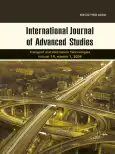The Use of Web Services to Optimize the Logistics Process in the Engineering Industry
- Authors: Nizamova L.N.1, Isavnin A.G.1
-
Affiliations:
- Kazan Federal University
- Issue: Vol 14, No 1 (2024)
- Pages: 156-167
- Section: Articles
- Published: 31.03.2024
- URL: https://journal-vniispk.ru/2328-1391/article/view/299563
- DOI: https://doi.org/10.12731/2227-930X-2024-14-1-275
- EDN: https://elibrary.ru/FIGKBL
- ID: 299563
Cite item
Full Text
Abstract
One of the important sectors in the economy is the metallurgical industry, which supplies raw materials and semi-finished products to other strategically important industries. The issue of quality control in this area is very relevant. Since the quality of the metal depends on the quality of subsequent products, products that must withstand all prescribed loads and regulations, as well as ensure safe operation for many years. Accordingly, all products of the metallurgical industry are subject to mandatory certification. The quality certificate is an official document and confirms the declared characteristics of the metal. All information from the quality certificate should be recorded in the information system in such a way that it is possible to track each specific batch of metal with the characteristics declared according to the certificate from purchase to release of finished products. The article discusses new possibilities of using web services for the exchange of information on quality certificates between contractors with various information systems. The essence of this innovative method is that the metal supplier transmits the data according to the quality certificate together with the electronic printed form, and the buyer accepts this data and writes it to the integration bus using web services for subsequent transmission to the necessary information systems. Thus, the risk of errors that are present during manual input will be eliminated, the time for entering and processing information will be reduced to ensure the full operation of technical control in the organization.
Purpose. Optimization of the process of material and technical support by metal rolling for enterprises of the machine-building industry.
Methodology: the article used survey, analysis, comparison, modeling.
Results: a new method of transmitting information on quality certificates using web services, which allows you to avoid errors during manual entry, as well as optimize the registration process of admission.
Practical implications it is advisable to apply the obtained results for enterprises of the machine-building industry engaged in the purchase of rolled metal.
About the authors
Lilia N. Nizamova
Kazan Federal University
Author for correspondence.
Email: Garnetti@yandex.ru
Russian Federation, 18, Kremlevskaya Str., Kazan, 420008, Russian Federation
Alexey G. Isavnin
Kazan Federal University
Email: isavnin@mail.ru
Doctor of Physical and Mathematical Sciences, Professor
Russian Federation, 18, Kremlevskaya Str., Kazan, 420008, Russian FederationReferences
- Anisimov V.I. Methods of building schematic systems of computer-aided design using a service-oriented approach based on the WebSocket protocol / V. I. Anisimov, V. N. Gridin, S. A. Vasiliev. Sistemy i sredstva informatiki [Systems and Means of Informatics], 2016, vol. 26, no. 2, pp. 136-146. https://doi.org/10.14357/08696527160209
- Voronova O. V. Formation of data architecture of FMCG-retail network companies on the basis of modeling the main business processes (by the example of the business process "purchase") / O. V. Voronova, I. V. Ilyin, O. Yu. Ilyashenko. Izvestiya Sankt-Peterburgskogo gosudarstvennogo ekonomicheskogo universiteta, 2019, no. 6(120), pp. 105-115.
- Mirzoeva S.A. Organization of material and technical support at machine-building enterprises. Regional'nye problemy preobrazovaniya ekonomiki [Regional problems of economic transformation], 2010, no. 4 (26), pp. 120-125.
- Nikitin S. Operational control of the chemical composition of metals and alloys - a guarantee of the quality of products. Territoriya Neftegaz [Territory Neftegaz], 2010, no. 2, pp. 28-29.
- Nizamova L.N., Isavnin A.G., Frolova O.N. Measures to improve the systems of material and technical support of metal-roll at machine-building enterprises. Krasnoyarsk Science: Economic Journal, 2023, vol. 12, no. 4, pp. 7-18. https://doi.org/10.12731/2070-7568-2023-12-4-7-18
- Pleshchenko V.I. Development of the concept of joint economy and directions of transformation of procurement activities of manufacturing companies. Logistika segodnya [Logistics today], 2023, no. 1, pp. 20-25. https://doi.org/10.36627/2500-1302-2023-1-1-20-25
- Serrano N. Services, architecture and legacy systems / N. Serrano, J. Hernantes, G. Gallardo. Otkrytye sistemy. SUBD [Open Systems. DBMS], 2014, no. 8, pp. 20-22.
Supplementary files










